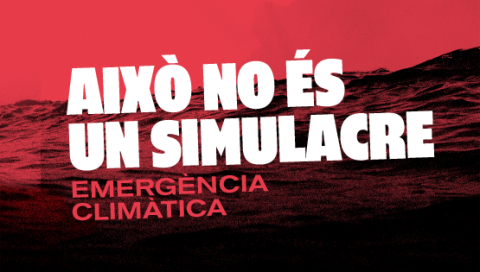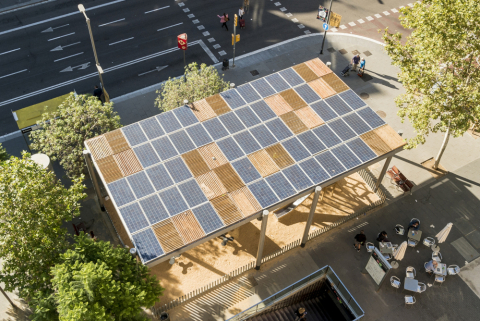Energy policies of the City Council
Cities are responsible for 70% of the CO2 emissions generated in the world and are especially vulnerable to climate change due to the high density of population and services concentrated in them. Thus, cities are part of the problem and yet they are also a crucial part of the solution.
The current energy model is based on fossil-fuel energy consumption, which has to be imported, and is one of the main sources of greenhouse gas emissions. By contrast, the energy generated from local (renewable and waste) resources represents a mere 2% of the total that is consumed in the city.
Barcelona is a city with a long tradition in fighting climate change. It has launched a number of planning initiatives since 2002 aimed at reducing greenhouse gas emissions, increasing the generation of renewable and local energies, improving energy efficiency and adapting to the expected impact.
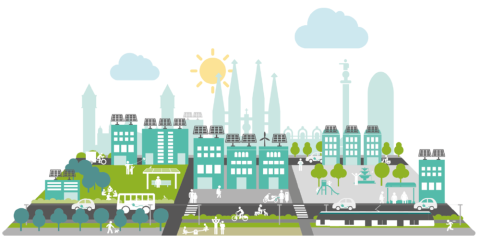
Climate Emergency Declaration and Climate Plan
Scientific evidence of the global climate crisis is irrefutable, and we are currently suffering its effects. We are, thus, facing a climate emergency. In order to deal with this situation, the actions that were set out in the Climate Plan need to be strengthened and speeded up. It is within this context that Barcelona has declared the climate emergency.
Climate emergency
Barcelona declared a climate emergency on 15 January 2020 and is speeding up a series of changes involving all the city’s stakeholders.
Climate Plan
On 26 October 2018, the City Council approved the Barcelona 2018-2039 Climate Plan. The time frame for the Climate Plan runs to 2030, and it includes both short-term (2018-2020) and medium/long-term (2021-2030) objectives and strategic measures. It has four strategic axes: mitigation, adaptation/resilience, climate justice and the promotion of citizen action.
Transition to energy sovereignty
The city is working to create its own energy model, based on supplying 100% renewable energy, with zero emissions and democratically accessible to everyone.
This change has to be made over time, as it entails involving city residents and providing them with the know-how to take decisions on energy, reconsider funding solutions, design new appropriate governance models and understand urban planning as a tool for advancing towards a sustainable and low-carbon future.
It is an investment in energy sovereignty: reducing energy consumption through efficiency, responsibly making use of energy, for self-consumption and maximum local energy generation using the city’s own resources, whether renewable (such as the sun) or waste, and by guaranteeing a basic supply for all of the city’s residents. The problems raised by present-day energy regulations likewise have to be resolved and collaboration by city residents has to be implemented.
The City Council is spearheading a new real policy aimed at enabling the achievement of a transition towards energy sovereignty, by putting people’s needs and energy issues at the top of municipal priorities.
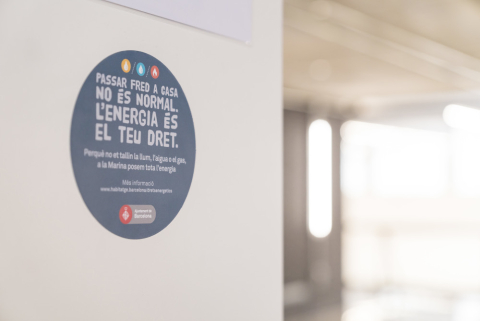
Energy rights for city residents
Electricity, water and gas are a basic right which everyone enjoys guaranteed access to. This is stated in Law 24/2015 which bans companies from cutting off supplies to vulnerable households and obliges them to maintain their services for as long as the situation of financial difficulties lasts.
Energy advice points are a Barcelona City Council service that offer people the help, information and intervention they need to exercise their energy rights and prevent companies from denying them access to basic utilities.
The City Council has citizen advice points where you can get more information.
Programme to promote solar power generation
L'Ajuntament impulsa l’aprofitament de les cobertes, els terrats i l'espai públic de la ciutat com a espais de generació d’energia, a través de l’estratègia d'impuls a la generació d'energia solar a Barcelona.
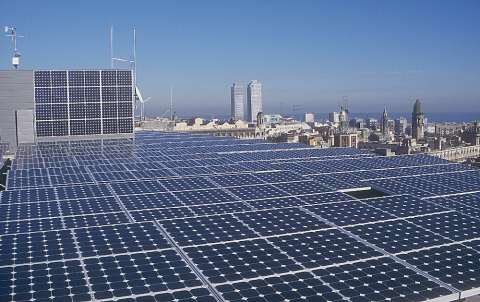
Other plans
- Energy, climate change and air quality plan (2011-2020)
The Barcelona Energy Agency developed the Energy, climate change and air quality plan for the 2011-2020 period (PECQ). This plan proposed cross-cutting and ambitious initiatives to meet the commitment signed up to by Barcelona, under the framework of the European Union’s Covenant of Mayors, to reduce its greenhouse-gas emissions associated with municipal activities by 20% in 2020.
- Barcelona energy improvement plan 2002-2010


